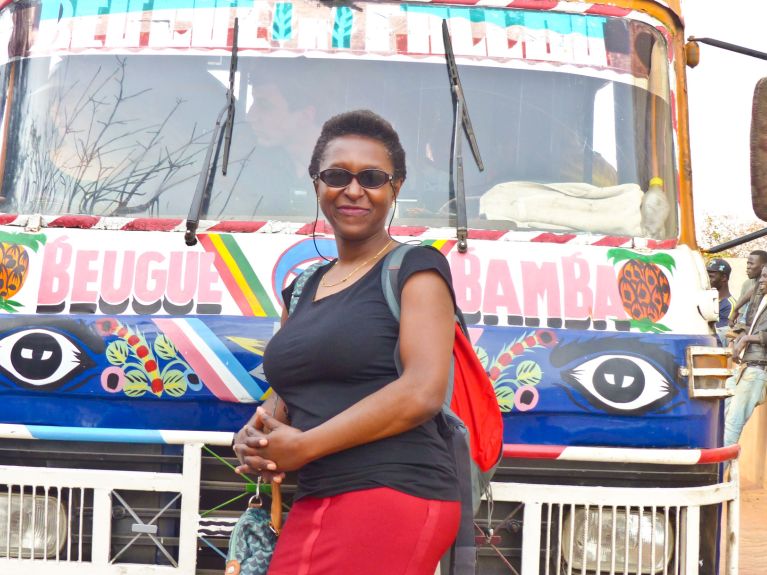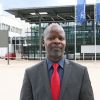“Taking your destiny into your own hands”
Africa does not require development aid, but self-confidence, says Veye Tatah. The journalist puts her finger on sore points in the relationship between Europe and Africa.

Veye Tatah from Cameroon is an IT expert, journalist and voluntary editor-in-chief of the magazine “Africa Positive”. She works in Dortmund as a consultant and advocates a positive view of African countries.
Ms Tatah, you arrived in Germany from Cameroon in 1991 at the age of 19. Back then, your view of Africa was of a continent of diversity and the sheer joy in life, while here you encountered an image of Africa defined by wars, crises and starving children. What is Africa really like?
The picture of Africa painted in Germany and other western countries is, I believe, a construct of a Eurocentric view of things. Everything that is “black” is presented as bad or considered inferior. Yet the 54 countries on the African continent are as different and diverse as those in Europe.
On the one hand, there are countries with well-functioning governments, a well-developed infrastructure and good economic prospects. On the other, there are countries with major problems and government agencies that do not function or have failed.
Western aid organisations benefit from the negative picture of Africa as it enables them to raise lots of donations. But Africa’s economy suffers as capital and investments do not head for Africa.
Not least the issue of migration is placing Africa increasingly in the focus of German and European politics. What must a genuine partnership between the continents look like if it is to solve the most pressing problems?
There was never a real partnership between the African and European countries. Europe, but also the USA and China, views Africa as a warehouse full of raw materials to be used for European economic and private needs. And as a market where it can sell surplus agriculture goods and second-rate products that do not conform to EU requirements – and which cannot be exchanged if faulty.
If the Europeans do not wish to accept African refugees then they must stop pushing through trade agreements that are not fair.
A genuine partnership must be based on mutual benefit. Which means that African countries must be able to process their raw materials locally, add value, and then export their goods to the European continent. That way, jobs are created in Africa and with them new prospects for the young people in Africa.
However, in some countries ownership of these raw materials has been in European hands ever since colonial days. If the Europeans do not wish to have African refugees on their doorstep then they must stop pushing through trade agreements with the Africans that are not fair and keeping despots in power by providing military support for them.
You doubt the efficacy of development aid as it all too often flows into the wrong channels and encourages a passive mindset. Africa must, you say, forge its future itself. How do you envisage that happening?
I know of no country world-wide that has actually developed thanks to development aid. No country can free itself from the vicious circle without economic activities and production facilities of its own. A country such as Niger with its huge uranium reserves should normally be rich. But Niger is one of the poorest countries in the world, as for decades France has held the rights to the uranium and only paid peanuts for it. Yet the West announces just how much military support it is providing for Niger to combat terrorism there. If Niger was itself to sell its uranium on the world market at an appropriate price, then the country would not require so-called development aid. And it could offer its citizens good prospects for life which would in turn pull the rug out from under the feet of the radical elements.
The Africans need to be more self-confident and believe more in themselves. The dire heritage of colonialism has fostered feelings of inferiority, passivity and a lack of independence. People need at long last to start taking their destiny into their own hands, acting on behalf of the common good and not just of their own ethnic or political clique. This ethnically-oriented mindset fosters corruption and prevents nation building.
“We need an African spring,” says corporate consultant Asfa-Wossen Asserate, who was born in Ethiopia and immigrated to Germany. He says the forces for reform in Africa must be supported. Is that a conceivable path?
An African spring must first arise inside the countries themselves. People must themselves realize that they and only they can change the conditions under which they live. Development starts in the mind. For that reason I believe that in many countries in Africa a well-functioning independent media world is absolutely imperative for the process of democratization. And of course the reformers should be supported.
Africa’s problem is not a lack of money, but of the right attitude towards creating sustainable structures for the next generation.
At the same time, Asfa-Wossen Asserate complains that the “good minds are no longer in Africa”. You likewise pursued your career here and now work as a consultant and project manager in Dortmund. Is your expertise not needed more urgently in your home country?
Mr Asserate is right. There are many well-trained people of African descent in the West. The majority are prepared to fly home and help progress the development of their countries. However, the government structures are so weak in many countries that tyranny prevails rather than the rule of law. Africa’s problem is not a lack of money, but of the right attitude towards creating sustainable structures for the next generation. The ossified political structures in some countries need to be reformed from the bottom up.
Interview: Martin Orth
